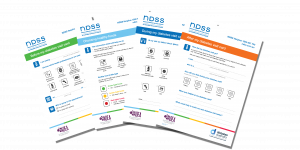Already a member? Click here to login.

Australian Diabetes Educators Association
Already a member? Click here to login.

Already a member? Click here to login.
2021-07-20

Adults with intellectual disabilities are two to three times more likely to develop diabetes.
However, there are limited diabetes-specific resources for this population. Due to the complexities of managing diabetes and a disability, it is important that people living with diabetes and an intellectual disability (and their carers) have access to easy to understand resources to help them manage their diabetes.
To meet this need, ADEA, funded by NDSS, has developed a series of 5 low literacy diabetes videos covering:
In addition to these videos, a pictorial information sheet titled choosing healthy foods is also available along with a series of 3 sets of diabetes visit cards (before, during and after a diabetes visit) which can be used to help prepare for visits to health professionals.
For more information and to access these resources go to the NDSS People with an intellectual disability page.
2021-07-20

Adults with intellectual disabilities are two to three times more likely to develop diabetes.
However, there are limited diabetes-specific resources for this population. Due to the complexities of managing diabetes and a disability, it is important that people living with diabetes and an intellectual disability (and their carers) have access to easy to understand resources to help them manage their diabetes.
To meet this need, ADEA, funded by NDSS, has developed a series of 5 low literacy diabetes videos covering:
In addition to these videos, a pictorial information sheet titled choosing healthy foods is also available along with a series of 3 sets of diabetes visit cards (before, during and after a diabetes visit) which can be used to help prepare for visits to health professionals.
For more information and to access these resources go to the NDSS People with an intellectual disability page.